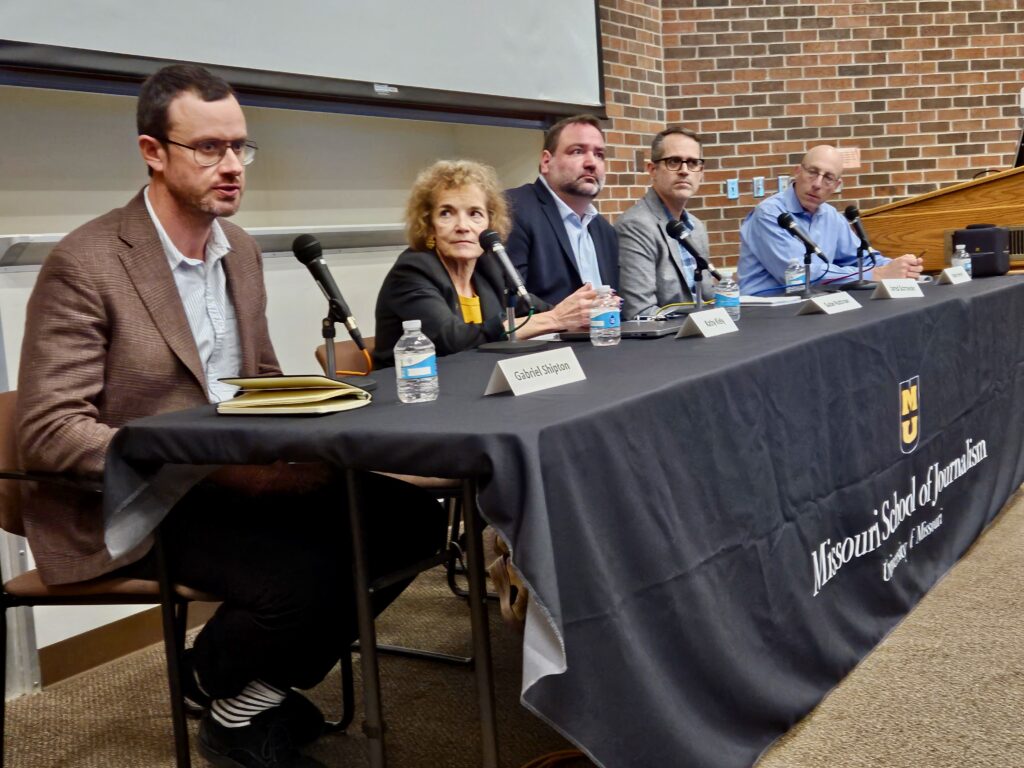Home » News » 2023 » October
News Brief
Oct. 24, 2023Columbia, Mo. |
By: Rudi Keller - Missouri Independent
Brother of Julian Assange visits Missouri to push for release of Wikileaks founder

By Rudi Keller - Missouri Independent
COLUMBIA, Mo. — After fighting extradition to the United States for more than four years, Wikileaks founder Julian Assange has one more chance to convince British judges that espionage charges against him are an unjust political prosecution.
If extradited and convicted, the Australian who created a website to share leaked government documents could be sentenced to 175 years in a federal prison.
But before that unscheduled court date, half-brother Gabriel Shipton said Monday to The Independent, the Department of Justice should drop the case.
Shipton was in Missouri this week for screenings of the pro-Assange 2020 documentary, “The War on Journalism: The Case of Julian Assange.” He also participated in a panel discussion at the University of Missouri Journalism School, and is heading to Washington, D.C., this week at the same time as Australian Prime Minister Anthony Albanese, to lobby on his brother’s behalf.
“Speaking to a source, communicating with a source, helping a source not get caught for supplying information to a journalist, is just journalistic activity,” Shipton said. “And so that’s why you have these people like the Freedom of the Press Foundation, or the ACLU, calling for the Biden administration to drop this because of the fact that it criminalizes these activities.”
Assange is charged with 17 federal crimes in the Eastern District of Virginia, accused of organizing a network to obtain classified materials and making those materials available to unauthorized people. The materials exposed airstrikes targeting civilians in the Iraq War, rules of engagement for U.S. forces and cables that showed what U.S. diplomats thought of their host countries around the world.
The unauthorized people who saw the materials, many provided to Wikileaks by US Army intelligence analyst Chelsea Manning, were the general public, both directly and through the news stories generated worldwide by the revelations.
The imminence of a final decision in Britain, and the visit of Albanese to Washington for meetings with Biden, has put a greater focus on Assange in recent weeks. Before he became prime minister, Albanese was a vocal supporter of dropping the charges against Assange and is expected to discuss the case with Biden.
Fox News reported Monday that Reps. Thomas Massie, R-Ky., and James McGovern, D-Mass. are circulating a letter in the U.S. House seeking bipartisan support for releasing Assange. Also on Monday, the online news outlet The Messenger published an opinion piece by three members of the Australian Parliament, each from a different party.
“The fact that the American who breached U.S. military secrecy laws and every U.S. publisher is free, but one Australian continues to suffer, is deeply insulting to our country and contrary to the Australian notion of a “fair go,” wrote the trio, which included a former deputy prime minister.
On Friday, the local assembly in Rome voted to make Assange an honorary citizen by early next year, Reuters reported.
Most of the events that became the subject of Assange’s indictment occurred in 2010 and the Department of Justice under President Barack Obama decided not to prosecute Assange. Manning was jailed for accessing the documents and has since been released after being imprisoned for seven years.
President Donald Trump’s administration reversed that decision and Assange was indicted in 2019, with a second, broader indictment issued in 2020.
For Obama, Shipton said, the issue was called The New York Times problem.
The Obama Administration’s thinking was “if we go after Julian Assange, we have to go after the New York Times, because they did the same thing,” Shipton said. “And then under the Trump Administration it became the New York Times solution, where prosecuting Assange means that we can have more control over the media.”
The screening Monday evening at the University of Missouri School of Journalism drew about 50 students, faculty and others for a panel that also included Gabe Rottman, director of the Technology and Press Freedom Project at the Reporters Committee for Freedom of the Press, Kathy Kiely, Lee Hills Chair in Free Press Studies, and Jared Schroeder, a professor of journalism specializing in First Amendment law.
The panel discussed how the Espionage Act, passed as the U.S. entered World War I, has been used and whether charging Assange puts journalists in danger if they report on government secrets.
Kiely said she doesn’t consider Wikileaks to be a journalistic endeavor. During 2016, she noted, Wikileaks released documents that included Democratic National Committee emails just before the July 2016 Democratic National Convention. The site did the same thing again an hour after the Washington Post revealed that then-candidate Donald Trump had told an entertainment reporter that he could grab women’s genitals because he was a television star.
One email she recalled, by John Podesta, chairman of Hillary Clinton’s campaign, morphed into accusations that a business named Comet Pizza was the headquarters of a child sex ring. In December 2016, an armed man was arrested at the pizza parlor after firing a weapon to close the non-existent sex ring.
A real journalist screens information before publishing, she said.
“When people use publication irresponsibly, real reporters suffer the backlash,” Kiely said.
In response, Shipton said publishers put out reports when they will have maximum impact.
Throughout the event, and the interview, Shipton sought to keep the focus on his brother and efforts to free him. His health has deteriorated, he is not allowed to make public statements and he has not been allowed to attend court proceedings in his case since the beginning of 2021.
“This is part of the dehumanization of Julian,” he said during the panel discussion. “They are taking him away from view to make what happened to him more palatable to the public.”
![]()






